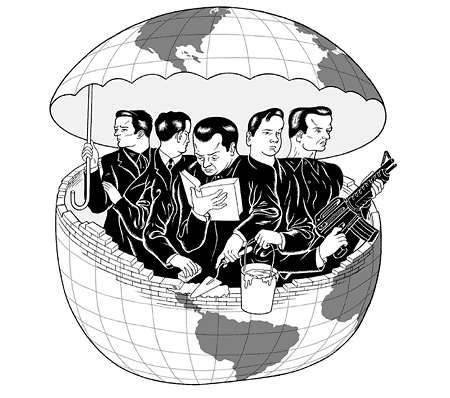Bradley S Klappler , Associated Press , Geneva | Tue, 07/29/2008 12:09 PM | Business
GENEVA (AP) - The world's largest commercial powers came into crucial talks on a new global trade pact pledging to assume the shared responsibility needed for solving planetary problems from climate change to food and energy prices.
But they are close to letting an arcane dispute over a seldom-used safeguard on farm imports spoil a trade deal worth billions of dollars to the global economy.
With huge question marks remaining on provisions to open up farm and industrial markets, the World Trade Organization's leading members on Monday were sharply divided over an issue worth practically nothing to the global economy.
A number of trade officials described the debate pitting the United States against China and India as one of principle - and not just hard economics.
"This is an issue that really concerns the livelihood of many developing countries," said Sun Zhenyu, China's WTO ambassador.
India, heavily criticized by the UnitedStates and Latin American countries Monday, said the standoff was the result of unreasonable demands from the U.S. and other rich nations.
"If blocking means not accepting whatever the developed countries say, so be it," Trade Minister Kamal Nath told repoters, adding that he has made his position clear on the subject since last week.
He said the idea of a "special safeguard" to deal with a sudden surge of imports or drop in prices had wide support: "It's not only India. We have 100 countries saying the same thing. It's the large economies that are isolted."
Earlier, the United States slammed the two emerging powers, saying they were threatening to scuttle the entire Doha trade round launched in the Qatari capital in 2001.
David Shark, a U.S. trade official, told the WTO's 153 members that the United States has "swallowed hard and accepted" a comromise proposal that includes tighter limits on farm subsidies to American farmers.
But he criticized India for rejecting a package of provisions laid out by WTO chief Pascal Lamy, and China for backing out of terms it committed to last week.
"Their actions have thrown the entire Doha round into the ravest jeopardy of its nearly seven-year life," Shark said.
While farm import safeguards currently exist in rich and poor countries, they are rarely used. The dispute over the current proposals concerns the threshold for when developing nations could spike their tariffs, and how high those taxes could ris
Shark accused China and India of insisting on allowances to raise farm tariffs above even their current levels. That violates the spirit of the trade round, the U.S. and other agricultural exporters argue, because it is supposed to help poorer countries develop their economies by boosting their exports o farm produce.
But China and India were not alone. Faced with rising food prices, a number of developing nations have sought wide loopholes against opening up their farm markets - either by blocking certain strategic products such as rice or grains or through rules that would allow them to raise tariffs sharply if faced with a sudden flood of imports.
Farming in the developing world is "not like manufacturing," said Trade Minister Mari Pangestu of Indonesia, the world's fourth most populous country. "It's not a machine you can just turn on or off."
Rich and poor countries have clashed repeatedly in the round that was once billed as a recipe for lifting millions of people out of poverty. The trade body is hoping for agreement this week on lowering farm subsidies and industrial tariffs, setting the stage for an overall trade accord by the end of the year. Signs of a breakthrough last Friday were followed by more entrenchment over the weekend.
Shark also accused China of trying to carve out cotton, sugar, rice and other commodities from any tariff cuts under a WTO deal. He said Beijing and Delhi were working to protect their own interests by controlling a large group of even poorer nations.
"Ironically, these policies would have their most serious detrimental effects on precisely those poorer developing countries that already have such limited agricultural export capabilities," he said.
Previous trade talks have collapsed over resistance in the rich world to cutting farm subsidies, which developing countries blame for distorting global commodities prices and hindering Third World development. The U.S. and the European Union have demanded new market opportunities for their industrial goods and service providers in exchange. Washington also wants better conditions for farm exports.
Before these talks began last week, EU Trade Commissioner Peter Mandelson described the challenge at hand.
"If collectively we fail this test in Geneva, it will reduce our ability" to tackle future tests to negotiate a pact limiting greenhouse gas emissions or tackle food scarcity, energy security or other world problems, he said.
"Rising powers are reshaping the postwar world," Mandelson said. "The risk we face is ... the absence of coordinated global action and leadership."



No comments:
Post a Comment